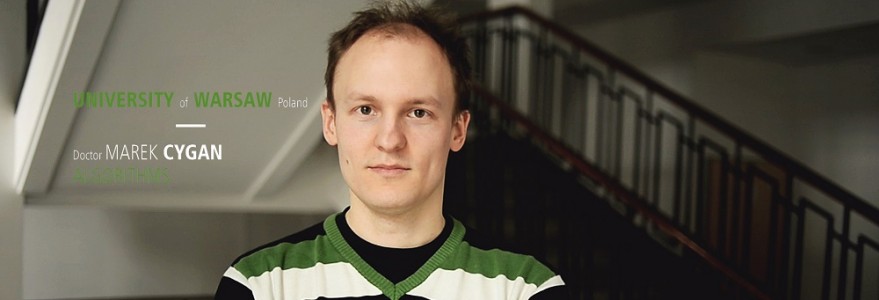Three scientists from the University of Warsaw who received ERC grants work on algorithms. One of them is doctor Marek Cygan. We present a video about him and his research.
So far, Internet users could watch 7 videos concerning the UW scholars whose research projects were financed by the European Research Council. The University of Warsaw is a leading institution of higher education in Poland which employees were awarded ERC grants – 9 scientists received that prestigious awards – 2 out of them got 2 grants.
This time we would like to present 8th video of the youngest scientist from the Faculty of Mathematics, Informatics and Mechanics of the UW – doctor Marek Cygan who was awarded ERC Starting Grant.
Marek Cygan
Scientist from the University of Warsaw will allocate the ERC grant – 1,4 million euro to work on algorithms. “Technology transfer between modern algorithmic paradigms” is the name of his research project which will be carried out at the University of Warsaw.
Doctor Marek Cygan proposes three research directions with potential of solving major long-standing open problems in both areas with the following objectives:
- transfer from approximation to FPT,
- transfer from FPT to approximation,
- rigorous analysis of practical heuristics.
His objectives lie in the frontier of fixed parameter tractability and approximation areas. The full achievement of his goals would change our understanding of both areas, with further consequences in other disciplines within computer science.
Before Marek Cygan became an academic teacher he was taking part in IT competitions. In 2005 he won the Google Code Jam. Two years later together with Marcin Pilipczuk and Filip Wolski won the ACM International Collegiate Programming Contest in Tokio. As a Phd student of Institute of Informatics of the University of Warsaw Marek Cygan got a 3rd place in TopCoder Open in Las Vegas.
He received many scholarships from the state institutions, among others, from the Ministry of Science and Higher Education, the Foundation for Polish Science and the National Science Centre. Young scientist was participating also in two academic programmes at UW: the Modern University and the Doctorates for Mazovia.



